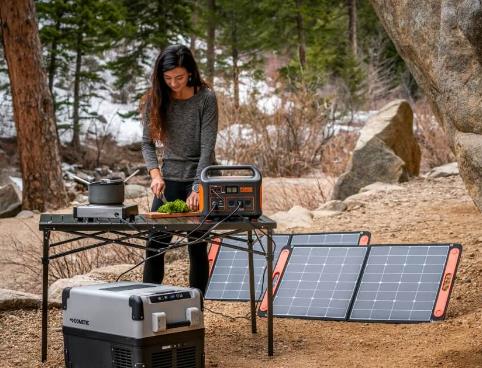Can a 100 Watt Solar Panel Power a Refrigerator?
Venturing into the world of solar energy brings forth intriguing questions about what's possible with a limited power supply. One common inquiry is whether a modest 100-watt solar panel can effectively power a household refrigerator. To unravel this puzzle, we must dive into the specifics of solar energy production, refrigerator power consumption, and the dynamics of solar power systems.

Understanding Solar Panel Output
Firstly, it's crucial to grasp what a 100-watt solar panel can deliver. Under ideal conditions—think peak sunlight with no shading—a 100-watt panel generates about 100 watts of power per hour. However, real-world conditions are rarely ideal. Factors like the angle of the panel, geographic location, time of year, and weather conditions can all reduce actual output. On average, you might expect around 4-5 hours of effective sunlight per day, equating to 400-500 watt-hours (Wh) of energy produced daily by a single 100-watt panel.
Refrigerator Energy Consumption: The Critical Variable
The energy appetite of a refrigerator varies significantly depending on its size, age, and efficiency. A modern, energy-efficient fridge might consume as little as 1-2 kWh (1,000-2,000 Wh) per day, while older or less efficient models could easily double that figure. For our analysis, let's consider a relatively efficient model that requires about 1.2 kWh per day.
Doing the Math: Feasibility Analysis
To determine if a can a 100 watt solar panel run a refrigerator, we compare the daily energy production of the panel with the daily consumption of the refrigerator. Assuming our panel produces an optimistic 500 Wh per day, it falls short of the 1,200 Wh daily requirement of the fridge.
Energy Storage: Bridging the Gap
The direct production from the solar panel isn't the whole story. Solar energy systems typically incorporate batteries to store electricity generated during the day for use at night or during low sunlight periods. To run our refrigerator continuously, a battery large enough to store surplus energy and cover the deficit during low production hours is essential. Considering efficiency losses in charging and discharging the battery, the system would need even more daily energy production, further highlighting the limitations of a single 100-watt panel.
System Enhancements for Adequate Power
While a single 100-watt panel alone may struggle to meet the needs of even a modest refrigerator, expanding the solar array can change the equation. Additional panels increase daily energy production, providing a more reliable power source for the fridge and other appliances. Moreover, a well-sized battery bank is crucial for ensuring that the refrigerator runs smoothly around the clock, compensating for the solar panel's variable output.
Professional Consultation for Tailored Solutions
Given the complexities of designing a solar power system that meets specific energy needs, consulting with solar energy experts is advisable. Professionals can assess your energy requirements, local sunlight conditions, and other factors to design a system that ensures your refrigerator and other essential appliances operate seamlessly.
Conclusion
In summary, powering a refrigerator with a 100-watt solar panel is a challenging proposition due to the panel's limited daily energy production compared to the refrigerator's consumption. However, with the right system design, including additional solar panels and a sufficient battery bank, it's entirely possible to run a refrigerator on solar power. This endeavor not only showcases the versatility of solar energy but also emphasizes the importance of careful planning and system optimization in achieving energy independence.